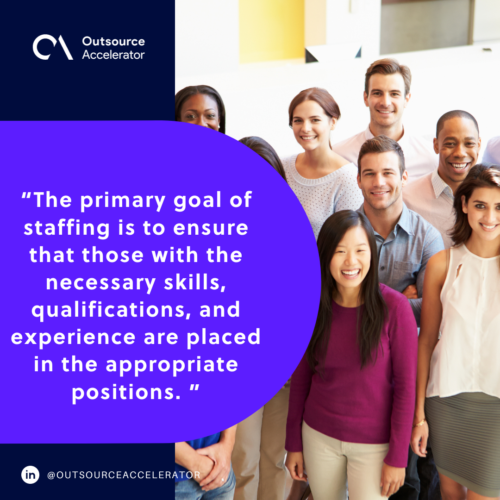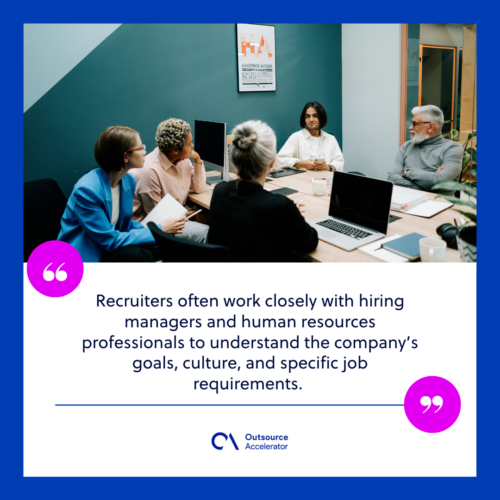Staffing vs. Recruiting: Key differences explained

It’s not uncommon for staffing and recruiting to be used interchangeably.
Both processes are associated with assembling an organization’s workforce. However, they are two distinct approaches.
When it comes to Staffing vs. Recruiting, understanding the nuances between them is essential for businesses looking to build robust, adaptable teams. If you need assistance in this venture, you can contact ConnectOS to help you assemble capable offshore teams.
This article inspects the intricacies of the two processes, looking into their functions, significance, and impact on organizational success.
What is staffing?
Staffing is finding, selecting, deploying, and managing employees for specific positions within an organization. It involves identifying the right people to fill specific roles in the company.
The primary goal of staffing is to ensure that those with the necessary skills, qualifications, and experience are placed in the appropriate positions.
Staffing is crucial in building and maintaining a capable workforce for operational continuity.

Tips for working with staffing agencies
Here are some tips for working with staffing agencies:
- Clearly define your immediate needs. Provide detailed job descriptions with clear expectations, required skills, and qualifications.
- Establish regular communication channels. Foster open and consistent communication to provide updates on any changes in your staffing needs, company culture, or evolving job specifications.
- Discuss timelines and urgency. Clearly communicate the urgency of your staffing needs to help align expectations and strategies.
- Provide timely feedback. After candidates are provided, offer prompt and constructive feedback to help the staffing agency refine searches and ensure better candidate matching.
- Understand fee structures. Ensure you clearly understand the agency’s fee structures and any additional costs.
What is recruiting?
Recruiting is the process of actively seeking, attracting, and hiring qualified candidates to fill job vacancies within an organization.
It’s a multifaceted function that goes beyond immediate staffing needs. Recruiting also involves strategic planning to build a competent workforce for the long term.
Recruiters often work closely with hiring managers and human resources professionals to understand the company’s goals, culture, and specific job requirements. They assess cultural fit, growth potential, and alignment with values.
Effective recruiting contributes to success by ensuring the right people are in place to drive innovation and productivity.

Tips for working with recruiting agencies
Here are some tips for working with recruiting agencies:
- Outline long-term hiring strategies. Discuss your vision for growth and the types of talents you anticipate needing in the future.
- Build a strong employer branding narrative. A strong employer brand attracts top talent and enhances the effectiveness of the recruiting process.
- Engage in ongoing relationship building. Regularly share updates about changes in your organization, new projects, or shifts in hiring priorities to help the agency stay proactive in meeting your needs.
- Emphasize quality over quantity. Encourage the recruiting agency to focus on presenting high-quality candidates rather than overwhelming you with many applications.
- Utilize industry expertise. Seek their insights on market trends, salary benchmarks, and effective strategies for attracting and retaining top talent.
Staffing vs. Recruiting: Side-by-side comparison
In the field of human resources, staffing and recruitment are two crucial tasks. While they’re closely related, they have some key differences:
Scope
In terms of scope, staffing primarily focuses on the short-term and immediate filling of positions to address current workforce needs. Staffing agencies frequently have a pool of qualified candidates readily available for efficiency.
Recruiting takes a more strategic and long-term approach. Recruiting agencies are typically engaged to identify and attract candidates likely to stay with the company for an extended period.
Nature of activities
Staffing involves job posting, resume screening, and matching candidates to existing job openings. Staffing agencies handle the entire process, even up to managing the performance and termination of temporary workers.
Recruiting encompasses a broader range of activities, including workforce planning, employer branding, sourcing candidates, and building relationships. They collaborate closely with companies, but the final hiring decisions rest with the employer.
Timeframe
Staffing requires a rapid response to fill positions promptly. Agencies usually have quick turnaround times for filling vacancies to maintain day-to-day operations.
Recruiting allows for a more deliberate and thorough approach, focusing on finding the best-fit candidates for the long term. The recruitment process may involve a more extensive evaluation and assessment.
Relationship building
Staffing agencies establish relationships with a large pool of candidates available for immediate placement.
Recruiting emphasizes relationships with a smaller pool of candidates who seek permanent employment. They invest more time in acquiring candidates who align with the organization’s goals and culture.
Cost
Staffing agencies usually charge fees based on the number of hours or days worked by temporary employees. The costs can vary depending on the level of expertise and duration of the assignment.
Recruiting agencies generally charge a placement fee based on a percentage of the candidate’s annual salary. The fee is typically due once the candidate is successfully hired.
Strategic alignment
Staffing tends to be more reactive, responding to current vacancies and fluctuations in staffing levels.
Recruiting is inherently proactive and aligned with the organization’s strategic goals. It considers future talent needs and potential skill gaps.
Quality vs. Quantity
Staffing often focuses on quickly filling positions with qualified candidates and prioritizing quantity to meet immediate demands.
Recruiting emphasizes quality over quantity, seeking candidates who not only meet current needs but also align with the organization’s culture, values, and long-term objectives.
Employer branding
Staffing may not always involve a detailed focus on employer branding, as the urgency is on filling positions quickly.
Recruiting recognizes the importance of a strong employer brand to attract top talent. It includes showcasing the organization’s values, culture, and opportunities for growth.
In summary, staffing addresses immediate workforce needs with a focus on efficiency. Recruiting takes a more strategic and comprehensive approach to building a sustainable talent pool aligned with the employer’s future objectives.
When it comes to filling positions within your organization, the choice between staffing and recruiting ultimately depends on your specific needs and goals.
Whether one is “better” than the other depends on the company’s timing, objectives, and vision.
There is no one-size-fits-all solution when it comes to filling your ranks. Rather than pitting the two against each other, a judicious approach recognizes their synergies.
The optimal approach may be a dynamic integration that leverages both strengths.
Staffing vs. Recruiting: Which is better to use?
When it comes to filling positions within your organization, the choice between staffing and recruiting ultimately depends on your specific needs and goals.

Whether one is “better” than the other depends on the company’s timing, objectives, and vision.
There is no one-size-fits-all solution when it comes to filling your ranks. Rather than pitting the two against each other, a judicious approach recognizes their synergies.
The optimal approach may be a dynamic integration that leverages both strengths.







 Independent
Independent




